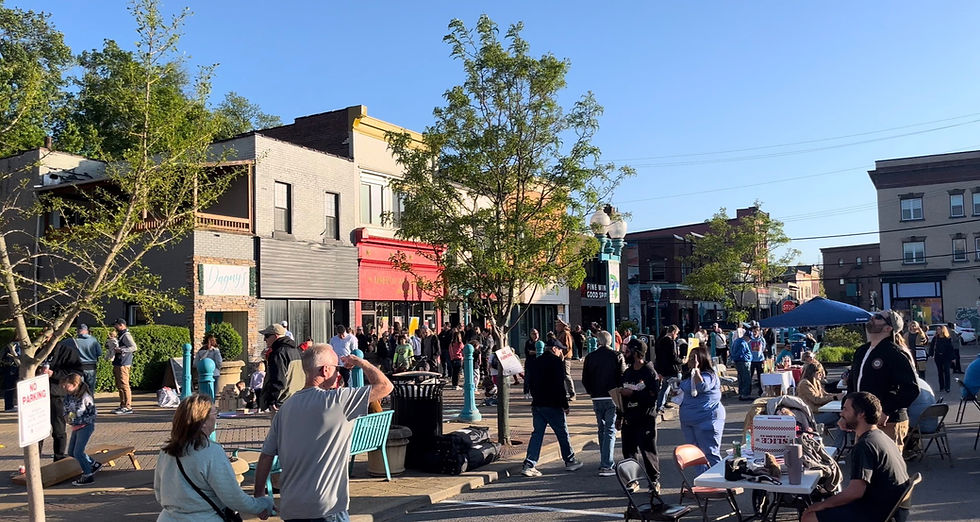Children’s Heart Foundation Works to Treat, Prevent Congenital Heart Defects
- Hilary Daninhirsch
- Apr 30, 2023
- 6 min read

The mission of The Children’s Heart Foundation (CHF) is to advance the diagnosis, treatment and prevention of congenital heart defects (CHDs) by funding the most promising research. Founded in 1996, the nonprofit has volunteer-led regions across the country, including in Pennsylvania. The Congenital Heart Walk, CHF’s signature fundraising event, will be coming to 30 cities across the country this year, including Pittsburgh. We spoke with Gail Roddie Hamlin, president and CEO of CHF, about the importance of research and how the organization is making an impact.
North Hills Monthly (NHM): How many children suffer from congenital heart defects, and what disorders does CHD encompasses?

Gail Roddie-Hamlin (Roddie-Hamlin): There are 2 to 3 million children and adults living with congenital heart disease in the U.S. There are many different types of heart defects that children are born with that can affect the structure and/or function of the heart. What we do know is that 25 percent of babies who are born with CHDs require some type of intervention or surgery within the first year of life in order to survive. That is how important this is; it is a public health emergency for families and for children who are born with heart defects. It will take continued funding of research in order to improve survival and quality of lives, especially as these babies grow into adults. Many of them require additional types of intervention or surgeries as they become young adults.
NHM: Are these defects treatable or curable, and can children born with congenital heart defects go on to live normal, full lives?
Roddie-Hamlin: Absolutely—the good news is that the death rate from CHD has dropped since 1999. Children and adults with CHDs are living much longer and are faring much better today than in decades past. We are having successful interventions and are learning more and doing a much better job at creating successful ways, tools, and applications to help children live and survive longer and to reduce deaths. However, surgery is often not a ‘cure’—children with CHDs need to be monitored by cardiologists throughout their lifetimes.
NHM: At what age is a child usually diagnosed, and is early diagnosis key to early invention?
Roddie-Hamlin: Yes, especially if they can diagnose the child while the mom is still pregnant, because doctors can intervene immediately when the baby is delivered. Some CHDs can be detected pre-birth by a Level II ultrasound or by a fetal echocardiogram. After birth, CHDs are often first detected when the doctor hears an abnormal heart sound or heart murmur.
NHM: CHF funds research initiatives for children afflicted with congenital heart defects—how much research has your organization funded so far, and why is research so important?
Roddie-Hamlin: We’ve funded over $16.5 million dollars in research and are continuing to raise more money. Really, the lion’s share of those dollars coming in over the last five to seven years were raised by our donors and supporters who’ve been impacted by CHDs.
Research matters. It allows for advancements, it allows for trials, it allows new techniques to be tried that prolong life for babies born with CHDs. A lot of these babies we’re talking about are now adults and are doing well. Many are engaged in sports, are married, and are doing things like anyone else. Yes, they have to be careful, but they are living fruitful lives.
NHM: How does The Children’s Heart Foundation work?
Roddie-Hamlin: We have 15 established volunteer-led regions across the country and about 30 well-defined community engagement markets around the country that are fundraising and raising awareness for CHF. Our goal is to have all 50 states engaged in the work that we do over time. We’re working on a model to do that right now.
NHM: Why is awareness about congenital heart defects in children so important, and how does your nonprofit work to raise awareness?
Roddie-Hamlin: CHDs are America’s most common birth defect: 40,000 babies are born with a congenital heart defect each year. That is a fact that most Americans do not know, so we’re trying to get more awareness out and do a better job of educating families who are impacted. For us, it’s important to get the word out that there is an organization like us there to help them.
In the big picture, heart disease is such an important area of study and one of those areas that is critical in its impact on Americans. When we start talking about communities of color and health equity, and making sure that people know there are hospitals out there that are dedicated to pediatric cardiology and that you can get specialized care—it opens such a window of opportunity to help prolong the lives of these children.
NHM: What strides have been made over the years in terms of research/treatments for congenital heart defects? Are you optimistic about the future?
Roddie-Hamlin: I am very optimistic about the future and I think that we have a great opportunity to raise even more money for research into congenital heart defects. Treatment options for CHDs have come a long way in a relatively short period of time. I think that what we need to do is to continue to raise awareness about CHDs and get more communities involved and engaged in this cause; not only those who are impacted but also the general public.
NHM: You have a big awareness-raising event coming up. Tell us about the Congenital Heart Walk.
Roddie-Hamlin: The Congenital Heart Walk is our signature event, and that is how we want to be known: It’s the front door to the organization. Participants will get awareness about everything we do, including volunteerism, research and advocacy. They’ll learn about children who are impacted and see them there with their families. They’ll experience, learn and feel the energy of the entire organization! Our Pittsburgh Congenital Heart Walk has been one of the stellar walks and has had great performance over its 10-year run. It is just phenomenal.
Pittsburgh Children’s Congenital Heart Walk to be Held June 24
You would never know from looking at her that 7-year-old Mila Kinneman of McCandless has already undergone several heart surgeries, including open-heart surgery at five days old as well as a heart repair at nine weeks of age. Mila was born with dextrocardia, a condition in which the heart is positioned on the right instead of the left. She also had coarctation of the aorta as well as a hole in her superior vena cava; two other holes closed on their own as she grew.
Mila’s mother, Lea, is a team leader and the lead volunteer for the Pittsburgh Children’s Congenital Heart Walk, which will be held this year on June 24 at the Pittsburgh Zoo. “As the mom of a daughter with a congenital heart defect, we wanted to help coordinate the event and raise awareness,” she said.
About 500 people attended last year, raising $111,000. As of this writing, Mila herself has raised $1,500 for the walk, and her mother has raised over $5,200. The walk will take place beginning with opening ceremonies at 8:30 a.m., and the funds raised will go to The Children’s Heart Foundation (CHF), which raises money for research into congenital heart issues.
“The CHF is a special place for all kids like Mila to come together and build a bond while raising awareness and funds to further the research to help them live longer, happier, healthier lives,” said Kinneman of her involvement with the organization.
With the help of her cardiologist, Mila has created a program called Reading with Mila for pediatric heart inpatients, who receive three books and a teddy bear in a bag. It’s all part of the family’s desire to help others cope, and Kinneman knows all too well how difficult it can be.
Kinneman makes sure to keep up with the latest research and is grateful to have access to UPMC Children’s Hospital of Pittsburgh, as it is the #3 hospital in the country for children’s heart issues.
“When you’re in the middle of the storm, you don’t realize the impact the CHF has until you are kind of out of the storm,” said Kinneman.
Mila is stable but could possibly need open-heart surgery in the future to repair the hole in her superior vena cava. “We’re in that watch-and-wait period: what does that research mean for us? Hopefully they will try to find a way to repair these holes or find ways to repair the heart with less surgical intervention that wouldn’t be as invasive,” said Kinneman.
Today, Mila is thriving and is keeping up with other children. “The only thing that kind of sets her back is that she gets a little winded if she exerts herself; she seems to just get out of breath easier, but that is the only thing that makes her slow down,” said Kinneman.
Volunteers can register to walk or to donate money by visiting https://events.chfwalk.org/event/pittsburgh.


























Comments